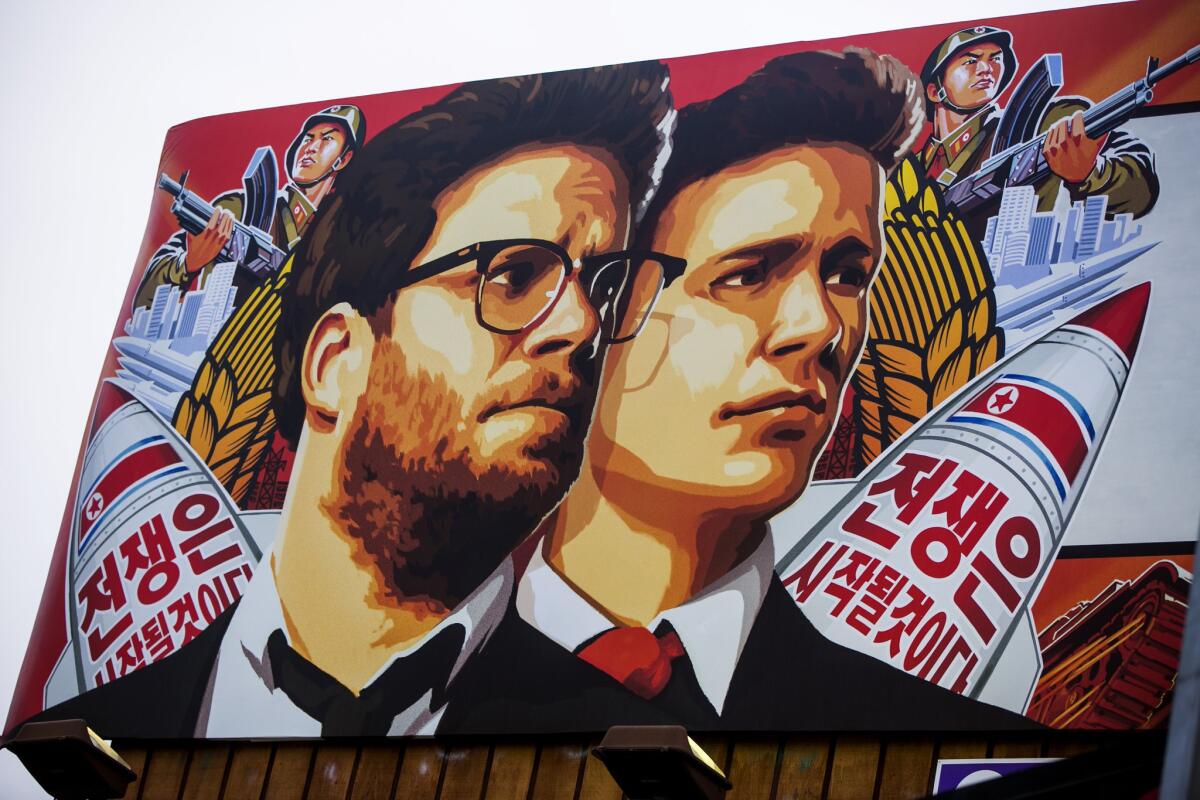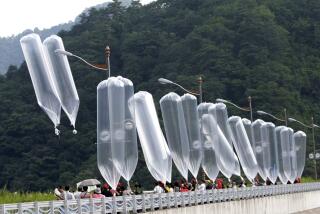Experts on North Korea see regimeâs fingerprints on Sony attack

Reporting from Seoul â A number of North Korea experts on Thursday echoed U.S. intelligence officialsâ assessment that the reclusive regime was somehow connected with the computer hack of Sony Pictures Entertainment, leading to a massive leak of sensitive data and threats that prompted the studio to cancel release of the North Korea-themed comedy âThe Interview.â
Though most ordinary North Koreans have no access to computers or the Internet, isolated and impoverished North Korea is believed to have a small stable of highly skilled hackers, and computer attacks are inexpensive to carry out and can be plausibly denied, a number of academics noted.
North Korea has a history of lashing out at those who criticize or ridicule it. Last spring, South Korea concluded that the North was behind a large hack of several South Korean banks and media outlets. The media outlets that were affected were all known for critical coverage of North Korea. South Korean government data put the damage caused by that attack and one other last year at more than $800 million.
âThe hacking code that was used in the attack on Sony was very similar to the code that North Korea has used in cyber attacks on South Korea, so I believe it was them,â said Kim Seung-joo, a professor at Korea University Graduate School of Information Security.
U.S. officials have not revealed what specifically has led them to conclude that North Korea had some hand in the attack on Sony.
âThe Interview,â starring Seth Rogen and James Franco, depicts U.S. journalists enlisted by the CIA to assassinate North Koreaâs leader, Kim Jong Un.
In June, Ja Song Nam, North Koreaâs ambassador to the United Nations, penned a letter to U.N. Secretary-General Ban Ki-moon, calling the movie an âact of warâ and urging the U.S. to âtake immediate and appropriate actions to ban the production and distributionâ of the movie. âOtherwise,â he added, âit will be fully responsible for encouraging and sponsoring terrorism.â
After the attacks on Sony began, though, North Korea claimed to have had no part in the incident. Still, it has lauded the hacking as a ârighteous deed of supporters and sympathizers.â
âAmbiguity of attribution and guerrilla-style tactical surprise are classic North Korea-style tactics that date back to the origins of the North Korean state,â wrote Scott A. Synder, director of the program on U.S.-Korea policy at the Council on Foreign Relations, in a blog post.
Still, if North Korea was involved, it is unclear why the hackers initially made no direct reference to âThe Interviewâ when they began leaking data stolen from the studio. The initial message from the hacking group, identifying itself as Guardians of Peace, said vaguely: âWeâve already warned you. This is just the beginning. We continue till our request be met.â
Sony itself said in early December that reports that North Korea had been identified as the source of the attacks were ânot accurate.â
One possibility is that North Korea was not solely behind the attack but cooperated with whoever carried it out. âItâs likely that they were involved and somehow initiated it, but the damage that Sony sustained was beyond North Koreaâs interest and capabilities,â said Leonid Petrov, a Korea studies researcher at Australian National University.
Petrov noted that much of what was leaked in the attack on Sony, including gossipy company emails and details of executivesâ salaries, wouldnât have been of any interest to North Korea.
âThe Interviewâ was never slated for release in South Korea, so its stateside cancellation has not garnered much attention among the public in Seoul. For South Koreans, North Koreaâs blustery threats are a part of everyday life and generally donât arouse much anxiety.
âSouth Koreans suffer from provocation fatigue. This is something that has happened many times before so itâs not as shocking to them as it might be to Americans,â said Peter Beck, a Korea expert at the New Paradigm Institute in Seoul.
Beck added that South Koreans have experienced serious attacks by the North, particularly 2010âs shelling of Yeonpyeong Island, in which four South Koreans died. âAnything they [North Korea] can do with computers pales in comparison to actually shelling civilians,â Beck said.
This isnât the first time that American filmmakers have poked fun at North Koreaâs ruling Kim dynasty. Kim Jong Il, the current leaderâs now-deceased father, was irreverently depicted in 2004âs âTeam America: World Police.â In that movie, Kim Jong Il was portrayed as an evil, lonely villain, but his roasting was more nuanced: He was also shown outwitting a U.N. nuclear inspector.
North Korea was not thrilled with that film, but registered its discontent through rather oblique channels. For instance, a North Korean diplomat in Prague asked Czech officials in 2005 to ban the film in that country; the request was rebuffed.
But âThe Interviewâ is far less subtle than âTeam America.â The filmâs plot hinges on a fictional mission to assassinate Kim Jong Un, and the young leader, believed to be 31, has his head blown up by a shell.
âI think this one really kind of hit a nerve because itâs specifically about Kim Jong Un and itâs talking about killing him,â Georgetown University Korea expert Victor Cha told South Koreaâs Yonhap News Agency in an interview.
Sony stock traded in Tokyo closed up nearly 5% Thursday after news that the studio had halted all plans to release âThe Interview.â
Borowiec is a special correspondent reporting from Seoul.
Staff writer Makinen reported from Beijing.
More to Read
Sign up for Essential California
The most important California stories and recommendations in your inbox every morning.
You may occasionally receive promotional content from the Los Angeles Times.











